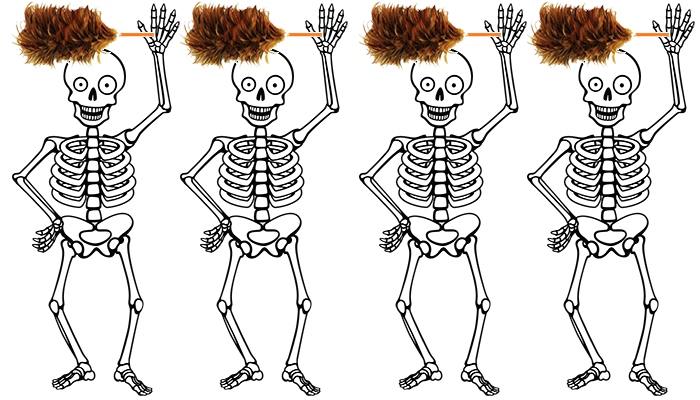[Name of E-Newsletter]
Helpful tips for family caregivers
March/April 2020
This spring, take a tip from the Swedes and consider helping Mom and Dad out with a light-hearted “death cleaning.” You will all benefit! And while we’re joking around, let’s talk about snoring. It actually is not a laughing matter. It may be a sign of sleep apnea, a condition that has been associated with serious heart and brain consequences. Last, we look at “radical acceptance” as one way to approach those caregiving issues over which you have no control.
Share Page:
Try "death cleaning" this spring
 You know all those knickknacks, files, and general “stuff” clogging your parents’ attic or garage?
You know all those knickknacks, files, and general “stuff” clogging your parents’ attic or garage?
Like many people, you probably dread the idea of sorting through them when your parents are gone. Chances are, Mom and Dad worry about this as well.
“Swedish death cleaning” is a humorous approach to decluttering that is focused on sparing survivors that difficult task. This method presumes that Mom and Dad are emotionally ready to let go of at least some physical belongings. To hold onto memories instead (take photos!). “Gifting to heirs” ahead of time is one way to get the ball rolling.
You and they need to agree that candor is important. For instance, that you can politely turn down things you don’t want and help find an appropriate alternative recipient (a relative or friend, an auction or donation, recycling, or the trash).
It’s wise to inform other family members of the process and ask them to weigh in on things they would or wouldn’t like to receive.
Often, the biggest challenge is getting into the mode of letting go. Start with large items, which are typically the easiest to shed. Items gathering dust in attics and basements are the next best bet for quick release. Turn to the clothes closet after that. Then files. Personal IRS returns can be shredded after three years.
Leave keepsakes, including letters, journals, and photos to last. Your loved one may want to sort through them alone. There may be items they prefer others not see. And if they aren’t ready to toss them yet, they can seal them in a box labeled “throw away.”
Death cleaning is a shift in philosophy about possessions. Elders who have decluttered this way say they feel lighter. Also, happier about not leaving such a burdensome task to their heirs. They also think twice before bringing more new “stuff” into the house.
Return to topDoes Dad "saw logs" all night?
 If your loved one snores, this may be a sign of “sleep apnea.”
If your loved one snores, this may be a sign of “sleep apnea.”
All snoring jokes aside, sleep apnea is a serious condition that deprives the brain of oxygen.
A person with sleep apnea goes without oxygen for at least 10 seconds, five to 30 (or more) times an hour.
It happens because the soft tissues of his or her airways collapse and stick together, blocking air.
What should be restful sleep time is instead mini-suffocations and a nightlong struggle to breathe.
Sleep apnea is more common in men than in women. Aging is a big risk factor. So is nighttime alcohol consumption. Both cause the soft tissue of the airways to lose tone and collapse. Obesity, smoking, and allergies are also contributors (all three narrow the airways).
Sleep apnea has multiple potential consequences.
- Type 2 diabetes. The chronic nightly jolts to the nervous system affect the body’s blood sugar control.
- High blood pressure. Sleep apnea is estimated to be a factor in 38,000 deaths from heart-related problems each year. The risk of heart disease increases by 30% and risk of stroke by 60%.
- Earlier onset of dementia. Those with sleep apnea appear to develop dementia as many as 10 years earlier than their full-breathing peers.
- Depression, foggy thinking, and irritability. Quality of life definitely goes down when you don’t get a good night’s sleep.
- Car accidents. Daytime fatigue seems to result in a 2.5 greater risk of falling asleep at the wheel.
Just because sleep apnea is more common in men does not mean that Mom is immune.
If either parent snores, wakes up with headaches or a dry mouth, complains of daytime fatigue, or has trouble with fuzzy thinking or irritability, talk to the doctor about a sleep apnea test. There are more than a few logs at stake.
Return to topAre you pushing against reality?
 We all quarrel with reality from time to time and wish things were different than they are. Especially when life seems unfair. For instance, your mom, who has disabling arthritis, develops memory loss and now can do even less for herself. Or your brother’s wife gets a promotion out of state, so he has to move and can no longer help with Dad.
We all quarrel with reality from time to time and wish things were different than they are. Especially when life seems unfair. For instance, your mom, who has disabling arthritis, develops memory loss and now can do even less for herself. Or your brother’s wife gets a promotion out of state, so he has to move and can no longer help with Dad.
While anger and resentment are completely natural responses, harboring such feelings does nothing to improve the situation. In fact, it perpetuates emotional suffering for you.
Although you can’t change these events, dialectical behavioral therapy (DBT) posits that your self-talk—your internal “story” about them—is where you have options to ease the strain in your life.
Don’t fight reality. By “radically” and unconditionally accepting life as it is—on its own terms, with no blame, anger, or resentment—you can shed a layer of tumult. It’s natural to think, “This shouldn’t be happening!” Without acceptance of what is, however, you’re in an endless and exhausting battle with reality, pushing the rock uphill when gravity clearly prefers it stay in the valley. Instead, try dropping any “shoulda, woulda coulda” thinking. Refocus your self-talk on the present, what is now and real.
Practice accepting self-talk. “I don’t like this but it is the truth of my situation.” “I am (sad/mad/frustrated) about this … but it is not something I can change.” “I accept that my life (or situation X) is what it is.”
It’s not as hard as you might think. We daily practice acceptance of little things, such as yielding to the fact of a traffic jam. And likely you have done it—eventually—for big things, too, like a breakup you may not have wanted.
When acceptance is not healthy
If you are in an abusive or unsafe situation, work toward change—not acceptance. Seek guidance from a counselor if you are uncertain.
Return to top